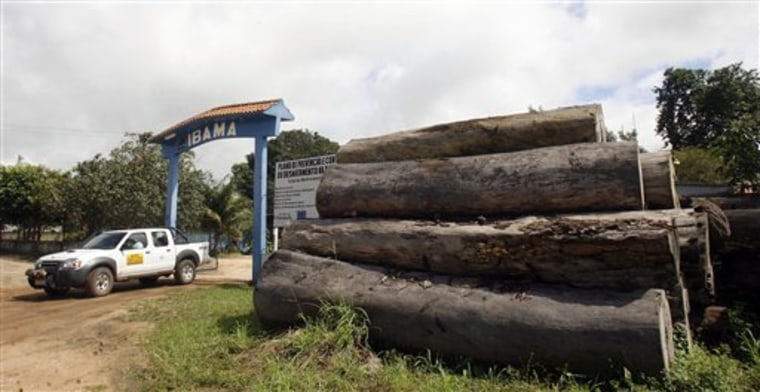Almost all the world’s tropical forests remain effectively unprotected even though two-thirds have been designated for some sort of preservation over the past two decades, according to a new survey.
The study of tropical forest management by the International Tropical Timber Organization surveyed 2 billion acres — two-thirds of the world’s tropical forests — in 33 countries.
All of those forests were designated by the governments and landowners overseeing them as being under “sustainable management,” meaning they were completely protected as conservation areas, or designated as sites where economic activities such as logging were only allowed if they didn’t destroy the forest.
However, the group said that what it called “the most extensive survey ever” found that less than 5 percent of these forests were managed in a sustainable way last year.
Scientists say tropical forests serve important environmental functions by providing habitat to countless species of plant and animal life, increasing rainfall and humidity, and helping to fight global warming by reducing carbon dioxide levels in the atmosphere.
Rainforests under sustainable management are roughly the size of Germany, but an area a third of that magnitude is being cleared each year for timber or crops, the ITTO said in a report that took four years to compile.
Figures by region
In Latin America and the Caribbean, 1.3 billion acres were designated for sustainable management, but only 27 million acres were actually protected.
In Asia and the Pacific, 415 million acres were earmarked for sustainable management, but only 48 million acres were managed that way. In Africa, only 14.8 million acres of 272 million designated acres were being protected.
The timber organization, which has 59 member nations representing most of the world’s countries with tropical forests, was formed under the auspices of the United Nations in 1986 amid global concern about disappearing tropical forests.
Its mission is to promote forest management that retains the “inherent values” of the forest while allowing businesses like timber to support local communities, the report said, adding: “It hasn’t always worked.”
“Some countries have already lost a significant part of their natural forest heritage,” the study said.
5 percent a big increase
On a positive note, the report noted that the nearly 5 percent of the land that is being managed correctly marks a drastic increase since the group first surveyed the forests: about 89 million acres in 2005 compared to less than 2.5 million acres in 1988.
“It does give us some hope that sustainable forest management is a viable land-use option and will continue to expand,” one of the editors of the report, Alastair Sarre, said in a telephone interview from Australia.
Still, sustainable management isn’t as profitable, at least over the short term, as illegal logging, agriculture and other uses, he said.
Other obstacles include poor government coordination with local communities and landowners; inadequate resources for enforcement, management and monitoring; armed conflicts that cause social and economic disruption; and long-standing land ownership disputes.
The least progress has been made in countries beset by civil war or other conflicts, such as Central African Republic, Ivory Coast and Liberia, the report said.
Nations cited as examples
In contrast, significant advances have been made in Malaysia, Peru, Bolivia and Brazil, it said.
Brazil, which has the largest percentage of the world’s tropical forests, requires landowners to maintain 80 percent of the forested areas in the Amazon. Logging is permitted in the forest reserve, but companies must file management plans to show their logging is carried out in a sustainable manner, with minimal damage to the forest.
The report recommends that governments and industry create more economic incentives for landowners and forest users; more international aid to help implement better management and enforcement programs on the ground; and legislation at the national level to protect tropical forests.
“This report says much has been done but much more needs to be done. It is good news but it is very fragile,” co-author Duncan Poore said. “It is a starting point. It shows where things ought to go. But there is no knowing if they will.”
Poore praised Malaysia for its long-standing legal framework for managing forests in a sustainable way and said Bolivia, Peru, Congo Republic, Gabon and Ghana had made good progress.
Plans not same as practices
But he said there was a large discrepancy between management plans and management practice that sometimes allowed illegal logging to lay waste large areas of pristine forest.
“There has been a huge increase in the amount of illegal logging -- which undermines the price of timber that is legally and sustainably logged,” Poore told Reuters.
“The only way to get proper policing is to persuade governments that their forests are worth protecting,” Poore said. “They must make forests managed sustainably for timber worth more than clearing them for crops.”
“Targeted aid could be used to that end. The key is to make sustainably logged timber financially competitive with alternatives and to stamp down on illegal practices.”
The survey will be released formally at the 40th Session of the International Tropical Timber Council, which meets from May 29 through June 2 in the Yucatan Peninsula city of Merida.
